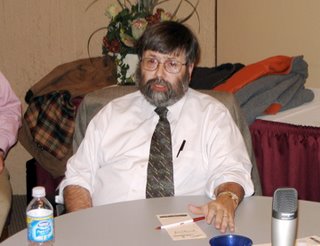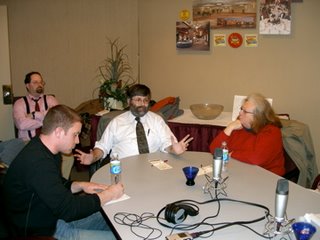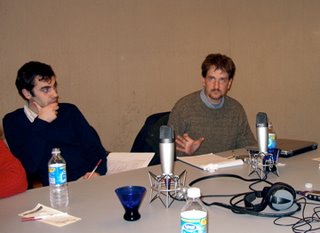A few weeks before the election I spoke to a voter in Trumbull County while doing some volunteer phonebanking. "Trouble County, that's what we call it," she said. "We're always making trouble for the folks in Columbus."
Indeed. There's trouble in next week's vote to name a replacement for attorney-general elect State Sen. Marc Dann (D-Liberty Township), whose 32nd Ohio Senate District comprises Trumbull and Ashtabula counties.
The Ohio Senate Democratic Caucus sent out a press advisory today indicating that the minority leadership for the current session will interview candidates on Monday, November 27th, and select a single preferred candidate. The twelve Democratic State Senators for the upcoming session will hold an up-or-down vote on the preferred candidate on Tuesday, November 28th. (The formal vote on the leadership team, already determined for all practical purposes last Friday, will also be held that day.) Spokesperson Amanda Conn
told the Youngstown Vindicator that if the preferred candidate fails to win approval from the caucus, it will proceed to vote on the second ranked candidate.
Trumbull provides 70% of the overall votes and 77% of the Democratic votes in the 32nd District. (Dann carried Ashtabula County over challenger Gary Pasqulaone (R) by just 14 votes out of 42,246 votes cast in 2004). On Friday, Trumbull County Democratic Party officials heard three-minute presentations from five candidates to replace Dann and voted to recommend three of them to the Ohio Senate Democratic Caucus (none ranked above any other):
* Two-time Congressional candidate Capri Cafaro (D-Liberty Township), who established a residence in Lorain County for purposes of her primary campaign in the 13th Congressional District this year but says that her real home is and always has been Trumbull County;
* State Rep. Sandra Stabile Harwood (D-Niles) of the 65th Ohio House District in Trumbull County; and
* Former State Sen. Anthony J. Latell (D-Girard) of Trumbull County.
Also seeking recommendation were
former city council member Sherry Cox-Calloway (D-Warren) and Matthew J. Cataline (D-Hubbard). The other state representative in Trumbull County is Randy Law (R-Warren), who just lost his seat to challenger Tom Letson (D-Warren). Ashtabula County is represented by George Distel (D-Conneaut), term-limited in 2008, who has
said that he is content to end his legislative career in the House.
On the residency issue, the Ohio Constitution requires state legislators to reside in the district for one year before election, but
Warren Law Director Greg Hicks said that the law allows multiple residency and he sees no reason why Cafaro should be disqualified on that basis. The Secretary of State' office has indicated that the Ohio Senate should make the final determination on the residency issue.
Without interviewing candidates, the Ashtabula County Democratic Party
recommended the same three candidates as Trumbull County late on Friday, noting that "after serious discussions with several eminently qualified Ashtabula County elected officials, it was their respective desires to continue to serve their constituencies." However, the Ashtabula Democrats expressed the strong wish that whoever may be appointed will work to promote economic growth and job creation in both counties, noting Ashtabula's potential for producing grain-based bio-fuels and wind power.
Calling her "a bright person with a genuine desire to serve in public office," who "has to go where the opportunity arises," the Lorain Morning Journal
spoke in favor of Cafaro's appointment on Sunday. She also has the backing of Dann, Warren Mayor Michael O'Brien, and several labor groups (UAW Local 1714, IBEW Local 573, and the Western Reserve Building and Construction Trades Council). These supporters argue that Cafaro has done well in her Congressional bids (she won 47% of the vote in Ashtabula County while losing badly to Rep. Steve LaTourette in the 14th District in 2004, and she may well have won the primary in the 13th District this year if Betty Sutton (D-Copley Township) had not secured the backing of the AFL-CIO and Emily's List) and that she is well-positioned to win in 2008, an issue bound up with her personal fortune and the backing of her wealthy family.
Several news accounts indicate that it was Dann who suggested the Ohio Senate position to Cafaro last summer, not the other way around. However, Cafaro has pursued the concept with unswerving zeal. A possible deal to put Cafaro in Stabile Harwood's House seat after the latter's elevation to the Senate was
apparently scuttled by Cafaro, and she has diligently lobbied lawmakers and Democratic party officials in pursuit of the position.
However, Youngstown Vindicator columnist Bertram da Souza wrote a
scathing piece yesterday, questioning Cafaro's bid on numerous points. He brings up the fact that Cafaro received immunity from prosecution in order to testify in a bribery case relating to disgraced former Congressman James Traficant (D-Youngstown), that her father J.J. Cafaro was convicted of giving Traficant an "unlawful gratuity," that she attended the Republican National Convention as an 18-year-old in 1996, and that she refused to be interviewed by the Vindicator editorial board in connection with either of her Congressional bids. The Warren Tribune Chronicle
expressed its preference for Stabile Harwood in an editorial as well, and threw more cold water on Cafaro's candidacy today in
a story entitled "You, Capri Cafaro, Are No John Kennedy". That article suggests that Cafaro's state senate bid is merely a detour on her road to Congress. The plan, it reports, calls for Cafaro to retain the state seat in 2008 and then run for the 17th Ohio Congressional District seat in 2010 when Rep. Tim Ryan (D-Ryan) runs for the U.S. Senate.
Reporter Stephen Oravecz casts doubt on every step of the plan. As to next week's appointment, Oravecz suggests that Democrats would do well to avoid the appearance of pay-to-play corruption by not appointing Cafaro at all, intimating that Dann's endorsement of Cafaro appears to result from the ample campaign contributions he received from the Cafaro family the past two years. On the re-election bid in 2008, there is the cautionary example of former State Rep. Chris Verich (D-Warren), appointed to the then-66th District seat to replace his brother Michael but ousted in the next election cycle by former Warren mayor Daniel Sferra (D). As to the 2010 U.S. Senate race, Ryan may decide to pass (especially if he gets the House Appropriations Committee seat he wants), and in any event there are other formidable potential candidates in Lt. Governor-elect Lee Fisher (D-Shaker Heights), Rep. Marcy Kaptur (D-Toledo), and Columbus Mayor Mike Coleman (D).
Next week's selection process is, without a doubt, a dilemma. Stabile Harwood has earned fair consideration, winning her district with 65% of the vote in 2002 and retaining it with 71% in 2004 and 79% in 2006. She points out that 41% of the Democratic voters in the 32nd Senate District reside in her House district. However, Cafaro's ability to self-finance her campaigns is hard to ignore, and nobody wants to alienate the deep-pocketed and politically-active Cafaro family. While Capri Cafaro has not held office (yet), she has been an active volunteer with organizations advocating for the elderly, and she has at least demonstrated resiliency in her desire to hold public office.
Still, the nagging question of an appearance of impropriety is the crux of the matter. The Cafaros have given millions to candidates and committees from both parties, but they were particularly active in supporting Marc Dann this time around. A look at
OhioMoneyTree.org shows that the Cafaros gave him $6,000 in 2004, $15,000 in 2005, and $30,500 in 2006, in addition to the $5,000 they contributed to support Dann's Senate campaign in 2003. The Cafaros also contributed to Stabile Harwood and Latell, but in much smaller amounts (Stabile Harwood got $850 during the years 2004-2006, Latell got $1,600 from 1995 to 1999).
Dann and Cafaro
vehemently deny that campaign contributions have anything to do with Dann's endorsement. Dann praised Stabile Harwood but said he prefers Cafaro on the merits, and Dann campaign spokesman Leo Jennings pointed out that other families contributed more than the Cafaros to Dann's attorney general bid. However, Stabile Harwood
told the Youngstown Vindicator that Dann "told her numerous times that he would endorse the person 'who helped him the most.'" Stabile Harwood hosted a fundraiser for Dann and gave $1,000 to his campaign, but could not match the Cafaros' financial support. Jennings said if Stabile Harwood's statement is a characterization that Dann would support whoever gave him the most money, it's "absolutely and completely false."
The issue, however, is not whether Dann
actually chose to support Cafaro in return for financial support, but the
appearance that this may have been the case. In his campaign for attorney general, Dann has pointedly asked supporters to hold him and other Democratic office-holders to the highest ethical standards, and the Democrats generally have pledged to clean up state government. Appointing Capri Cafaro to the Ohio Senate may not be the best road to the moral high ground, given the unsavory appearance of the thing. At a minimum, the Democratic leadership ought to put Dann's endorsement and the whole issue of Cafaro family political contributions to one side, and judge the candidates strictly on their other attributes.










